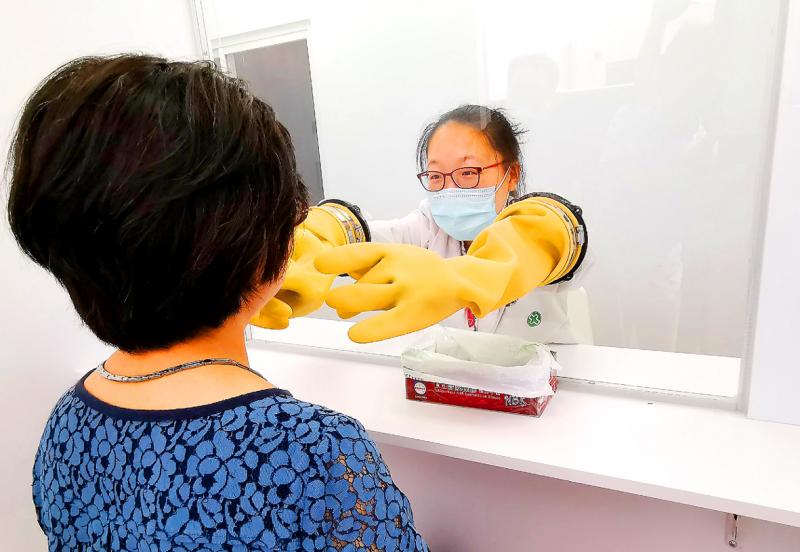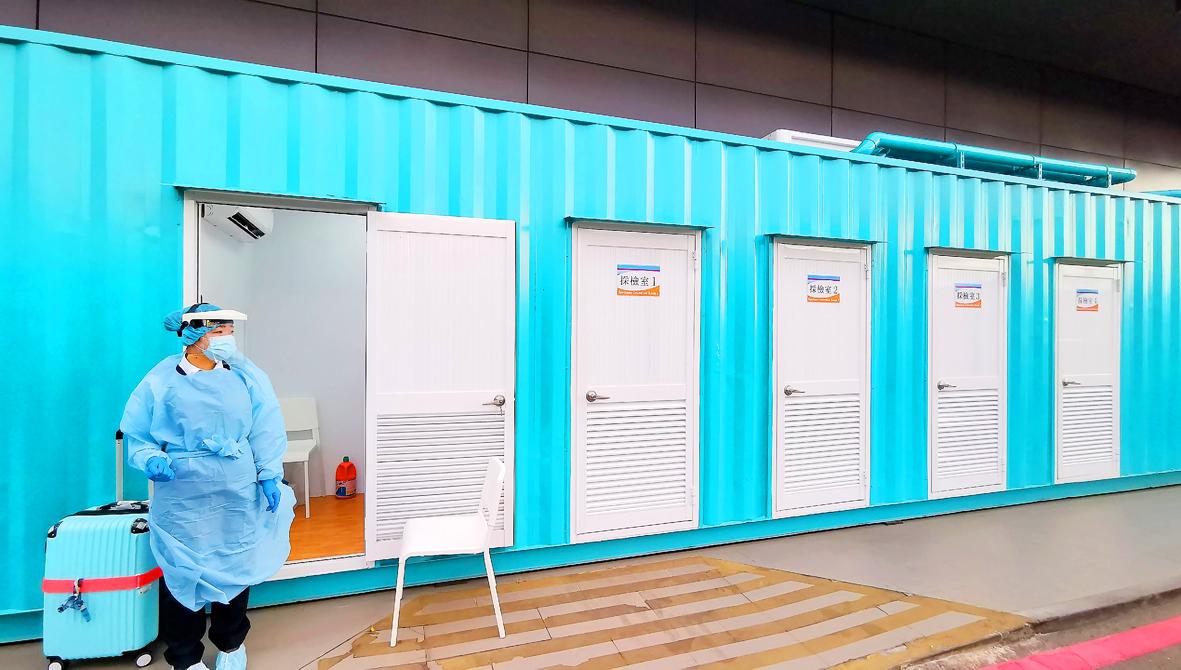The Central Epidemic Command Center (CECC) yesterday reported one new imported case of COVID-19, a Taiwanese woman in her 30s who traveled to the Philippines in late January for work.
Case No. 452 returned to the nation alone on Tuesday, the center said.
On June 30, her company arranged for her to take an antibody test, the result of which was negative, Centers for Disease Control Deputy Director-General Chuang Jen-hsiang (莊人祥), who is the center’s spokesman, said at a news conference in Taipei.

Photo: Tony Yao, Taipei Times
On Tuesday afternoon, the woman began experiencing an “abnormal” sense of smell, which she reported to authorities when she arrived in Taiwan that night, he said.
She was tested for COVID-19 at the airport, before being sent to a quarantine facility, the center said.
On her flight to Taiwan, the patient was seated in the first row and wore a mask for the duration of the flight, Chuang said.

Photo: Tony Yao, Taipei Times
Health authorities have identified 12 people as having had contact with case No. 452, including a passenger who was seated in the row behind her, and 11 flight crew members, the center said.
The other passenger has been placed under home isolation, while the crew members, who had taken proper protective measures, are practicing self-health management, it added.
As of yesterday, Taiwan has recorded 452 confirmed cases of COVID-19, including 361 imported cases, 55 local infections and 36 cases from the navy’s “Friendship Flotilla,” as well as seven deaths, CECC data showed.
Meanwhile, Taoyuan International Airport Corp yesterday began using new facilities to collect specimens to test for COVID-19 at the Taiwan Taoyuan International Airport.
The specimen-collection structures, two converted 12.19m shipping containers, will be where passengers visiting or returning from pandemic-affected nations or regions can be tested.
The containers — outside Terminal 1 and Terminal 2 — were designed to meet requirements governing the collection of diagnostic specimens from air passengers, the airport operator said.
Each has five inspection rooms, where staff and passengers are separated by walls and acrylic partitions, it said, adding that they have separate air-conditioning systems as well.
When necessary, each inspection room can accommodate more than one passenger at a time, the company said.
Staff members only need to wear gloves, insert their hands into two holes in the partition and gather samples, it said.
Each inspection room would be ventilated through a high-efficiency particulate air system, and workers use alcohol and ultraviolet light to disinfect and sterilize the facilities, it said.
All samples are temporarily stored in a separate room before being sent to medical laboratories, to prevent the spread of the disease, the company said.
The airport had previously used two makeshift facilities outside the terminals to collect specimens. Each was built with wooden partitions and did not have a roof for ventilation purposes, it said, adding that staff members were required to wear full protective gear and could only handle one passenger at a time.

Taiwan is stepping up plans to create self-sufficient supply chains for combat drones and increase foreign orders from the US to counter China’s numerical superiority, a defense official said on Saturday. Commenting on condition of anonymity, the official said the nation’s armed forces are in agreement with US Admiral Samuel Paparo’s assessment that Taiwan’s military must be prepared to turn the nation’s waters into a “hellscape” for the Chinese People’s Liberation Army (PLA). Paparo, the commander of the US Indo-Pacific Command, reiterated the concept during a Congressional hearing in Washington on Wednesday. He first coined the term in a security conference last

Prosecutors today declined to say who was questioned regarding alleged forgery on petitions to recall Democratic Progressive Party (DPP) legislators, after Chinese-language media earlier reported that members of the Chinese Nationalist Party (KMT) Youth League were brought in for questioning. The Ministry of Justice Investigation Bureau confirmed that two people had been questioned, but did not disclose any further information about the ongoing investigation. KMT Youth League members Lee Hsiao-liang (李孝亮) and Liu Szu-yin (劉思吟) — who are leading the effort to recall DPP caucus chief executive Rosalia Wu (吳思瑤) and Legislator Wu Pei-yi (吳沛憶) — both posted on Facebook saying: “I

Sung Chien-liang (宋建樑), who led efforts to recall Democratic Progressive Party (DPP) Legislator Lee Kun-cheng (李坤城), was released on bail of NT$80,000 today amid outcry over his decision to wear a Nazi armband to questioning the night before. Sung arrived at the New Taipei District Prosecutors’ Office for questioning in a recall petition forgery case last night wearing a red armband bearing a swastika, carrying a copy of Adolf Hitler’s Mein Kampf and giving a Nazi salute. Sung left the building at 1:15am without the armband and covering the book with his coat. Lee said today that this is a serious

A mountain blaze that broke out yesterday morning in Yangmingshan National Park was put out after five hours, following multi agency efforts involving dozens of fire trucks and helicopter water drops. The fire might have been sparked by an air quality sensor operated by the National Center for High-Performance Computing, one of the national-level laboratories under the National Applied Research Laboratories, Yangmingshan National Park Headquarters said. The Taipei City Fire Department said the fire, which broke out at about 11am yesterday near the mountainous Xiaoyoukeng (小油坑) Recreation Area was extinguished at 4:32pm. It had initially dispatched 72 personnel in four command vehicles, 16